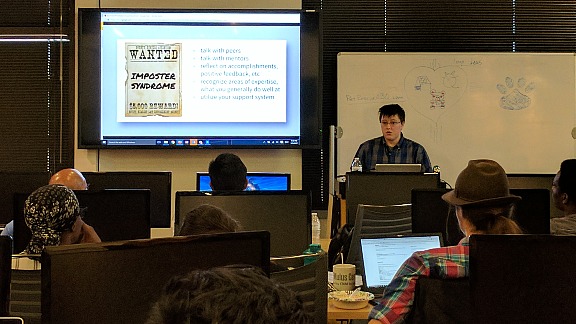On Friday May 4th, Matterform Junior Developer, Alicia Broadhurst, visited the CNM STEMulus Center to speak about Imposter Syndrome to the current Deep Dive Fullstack class. Deep Dive Fullstack is one of several coding bootcamps offered through Deep Dive, which is a part of CNM Ingenuity, a nonprofit that helps Central New Mexico Community College pursue cooperative ventures in technology and entrepreneurship. Deep Dive Fullstack teaches both front-end and back-end development. Matterform believes strongly in the potential of entry-level developers, and presents regularly at the bootcamp on various topics related to web and software development.
The definition of Imposter Syndrome is “high-achieving individuals who are marked by an inability to internalize their accomplishments and have a persistent fear of being exposed as a ‘fraud’.
Imposter Syndrome is common in the programming industry, among others, especially for developers still in school, or those at the beginning of their careers. These developers often feel the most insecure about their skills or the speed of their current progress.
Alicia Broadhurst is a Deep Dive Fullstack graduate, and so understands the challenges and pressures placed on students during the 10-week program. Incoming students often feel a lot of uncertainty, especially since a large percentage of Deep Dive Bootcamp attendees are changing careers. They wonder if they can hack it given the rigorous schedule, or if following graduation, they’ll be able to find a job given their limited developer work history.
Three speakers were lined up to speak on the topic: Giovanna Rossi from Well Woman Life, Alicia Broadhurst from Matterform, and CNM Career Counselor Daniel Heron. Alicia Broadhurst’s presentation focused on the programming dichotomy commonly presented in tech circles–that day and night difference between the success of having solved a problem, and the sometimes laborious process of working towards a solution. Alicia highlighted how that sort of thinking can lead to arrogance or increased feelings of insecurity, and given how programmers never stop learning, either thought doesn’t reflect the truth. Suggestions on dealing with Imposter Syndrome were also given, emphasizing open and honest communication with peers and mentors.
Imposter Syndrome can happen to anyone at any point in their career. It has an insidious nature and can slink up when you least expect it. A little bit of self-doubt can quickly spiral out of control, which is why staying open to constructive feedback from other developers is very important. Whether that feedback is found by speaking to coworkers, or through networking with the local and worldwide developer community, listening to that feedback and continuing to grow will eventually instill confidence. Confidence though, not arrogance. And when you’ve nurtured that confidence you’ll find that listening to that self-doubting voice will grow more and more difficult.


